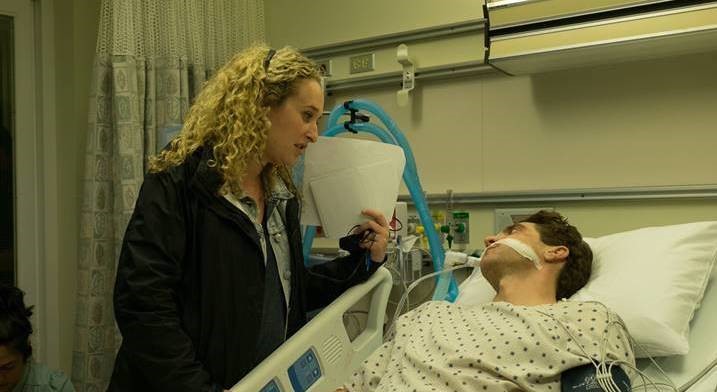
- Industry
Riva Marker – A Producer Giving a Stronger Voice to the Unheard
“There’s nothing inherently gender-specific about the work that I do,” notes Riva Marker, co-founder of Nine Stories, the production company that has a first-look deal with Bold Films and which producer the Jake Gyllenhaal starrer, Stronger. Jake also happens to be her producing partner, and the two are spearheading a drive both to bring intimate, more character-driven movies to the screen, as well as strong portrayals of women. The two are also committed to creating opportunities for women below the line, something that is sorely needed in an industry where representation of women is still notoriously abysmal.

Riva Marker on the set of Stronger with Jake Gyllenhaal
Scott Garfield
Of the top 250 films of 2016, only 7% were directed by women. In the producing category, women produced almost 25% of all films, and of the top 100 (grossing) films in 2016, women accounted for only 32% of all speaking characters. Riva notes that Stronger, though it features a male protagonist, has many weighty roles for women too. “On our next film, we’re working with a new filmmaker, Courtney Hoffman, just one of many female directors we are keen to be in business with. It’s a mandate of the company to work with top talent and be gender and color blind.”
Marker’s career path is a blueprint for how to take charge of your life and craft your dreams into reality. She has an eye for narrative film, perhaps influenced by growing up in a suburban Connecticut family with a mother whose parents survived the Holocaust and a father who was orphaned at age three. “I’ve always understood that life is incredibly fragile and precious. Death has always been a real presence in my life,” says the Penn State graduate who hoped to transition to the west coast after winning a prestigious internship in documentary filmmaking from the Academy of Motion Pictures Arts and Sciences. However, the gig was with The Discovery Channel, which was based in D.C., and it didn’t take long for Marker to figure out that “the producers of the content weren’t the networks themselves, but a few independent production houses and the most prolific were British.” So, Marker flew herself over to London where she received two job offers. “They sponsored my visa, and I moved to London on September 3, 2001, eight days before the 9-11 terrorist attacks in New York City.” After two years in London, Marker’s dad was very ill. “I decided I wanted to be with my father, so I moved back to New York City and completely started over.”
Marker continued, “My contacts were in documentaries, but my love was narrative features. It didn’t translate. I’ve always loved post-production, and while my father was dying, working in editorial allowed me to feel connected to something tangible that gave a sense of progress at the end of the day.” Ultimately, Marker came up to producing through post.
Marker says she benefitted not only from working hard and being ready when the opportunity arose but by also doing something that many men excel at: making use of informal networks. While trying to gain traction as an assistant editor, she met and was hired by Jessica Levin, a fellow post producer, to work as an assistant editor on the independent film Day Night Day Night. “Jess knew my background was as a documentary producer, and she later hired me to post supervise a number of films she was doing under the banner, Plum Pictures, an independent production company. Plum was having a very prolific run, and I started handling significant budgets,” Marker explains. She was quickly overseeing post on five to seven films a year. “The female co-founders allowed me an entire purview into producing, from being on set to raising financing, as well as running post-production. When I came across the script for The Kids Are All Right, I immediately knew this was a script I wanted to champion. I raised and closed a quarter million dollars for that film, and it changed my trajectory.” Suddenly, she was utilizing everything she’d learned to date: how to ask for what she wanted; create her own opportunities; use her position as collateral to network, and showcase her abilities to leverage access.
This savvy strategy was enhanced by traits she’d learned as a child. “My parents were both very opinionated, strong-willed, and loud. They were always yelling at each other for what they wanted, for better or for worse.” Riva verbalizes the need for what many women in competitive workplaces have also noted: the ability to feel comfortable with confrontation. “Although my parents were very encouraging and there was no gender dynamic in my household, it was in many ways a Jewish/female-driven space, in that there was an understanding that women could do whatever they needed to do to get something done. I don’t wilt when things get tense,” says Marker. “And things in our industry are often tense. Everybody has a point of view and an opinion that they feel passionate about. You often must fight for it. She also says she has experienced no fallout from being in a same-sex marriage, noting that trailblazers like Billie Jean King and Ellen helped to pave the road she treads today.
Returning to the issue of gender dynamics in negotiation, Marker notes that women have to be aware of going inside their own heads. “In those big meetings before a film comes out, you’re talking to marketing teams, publicists, studio heads … many women can be fearful of speaking up, afraid of sounding stupid or unintelligible, or worried that they don’t know the sphere in which they are engaging. I don’t know where those demons of doubt come from or if men have them too, but sometimes that fear prevents us from speaking up, and we can’t do that. I’m always trying to push myself to work through the fear.”
How does she handle being one of a few women in a power room? She laughs. “I just force myself not to chicken out, and remind myself to say the thing I want to say.” She points out that keeping quiet comes at a cost. “The times that I have not asked the question that I wanted to, out of fear that someone is going to be judgmental or critical of my question, are the instances that I want to kick myself most afterward. It’s almost always the thing that is bound to get overlooked, or that doesn’t happen, or that’s done wrong.”
“So may times, I have literally had this 60-second argument with myself: here are the reasons why you are going to ask this question, even though you’re scared to put yourself out there, and even though it might feel combative.” Marker acknowledges that if everybody else is on board with a plan, asking the question that second-guesses that plan is sort of terrifying. “When you feel like you’re the only person who is poking holes in a plan, it can be hard to make yourself speak up.” But she’s always glad that she does, and women can take a page out her book. Finding our voice is imperative. “The best strategy is over-preparation.”
In closing, Marker adds a final piece of advice for those who would follow in her footsteps. “I have had the most success telling stories I feel the most passionate about. Allow yourself to be drawn to stories that really move you, or piss you off, or unnerve you, and make those films.” Nine Stories seeks out stories that give a voice to people who don’t necessarily often have it, “Be aware of that,” says Marker, “and be an advocate for people who are incredibly talented and need a chance.

